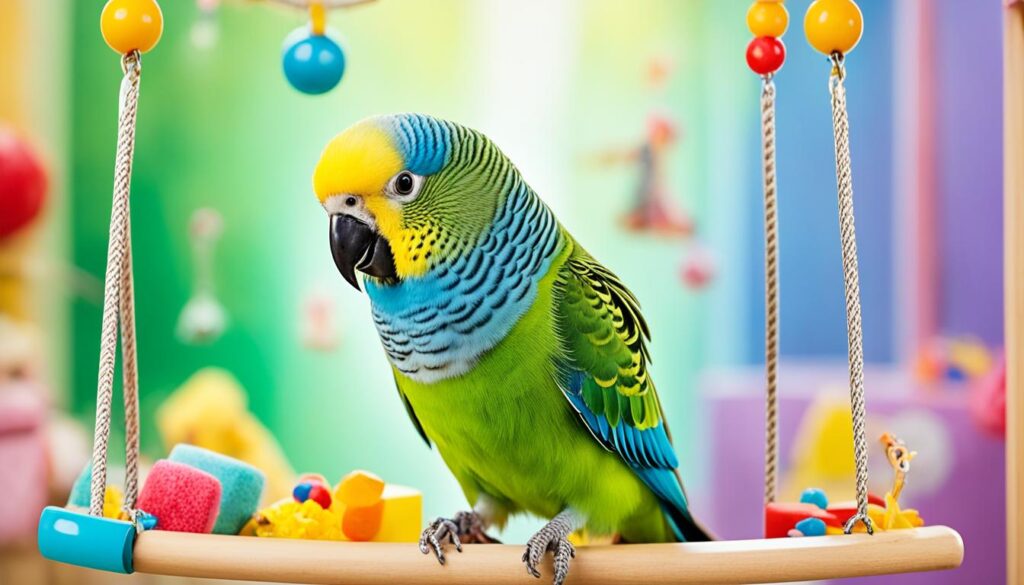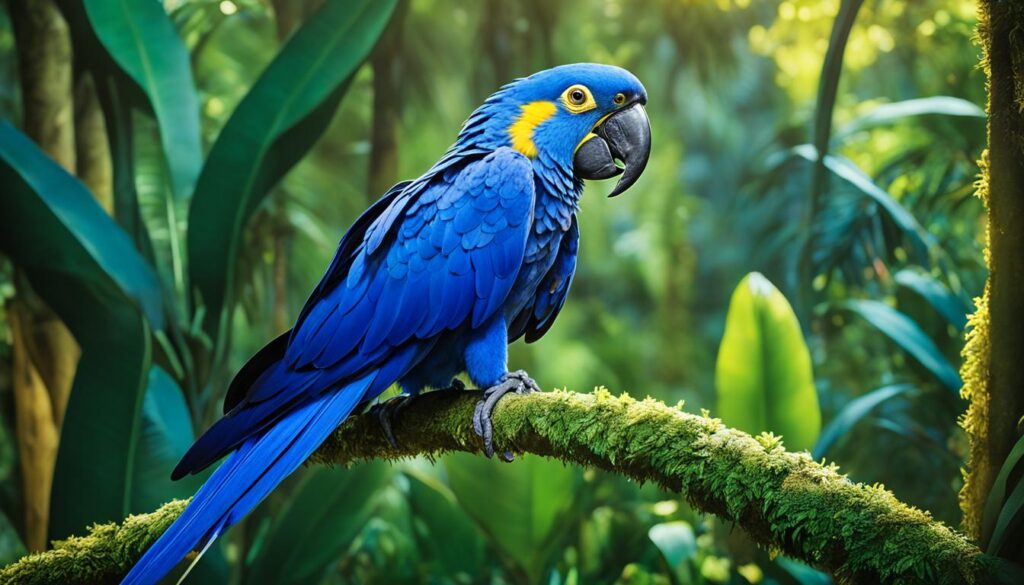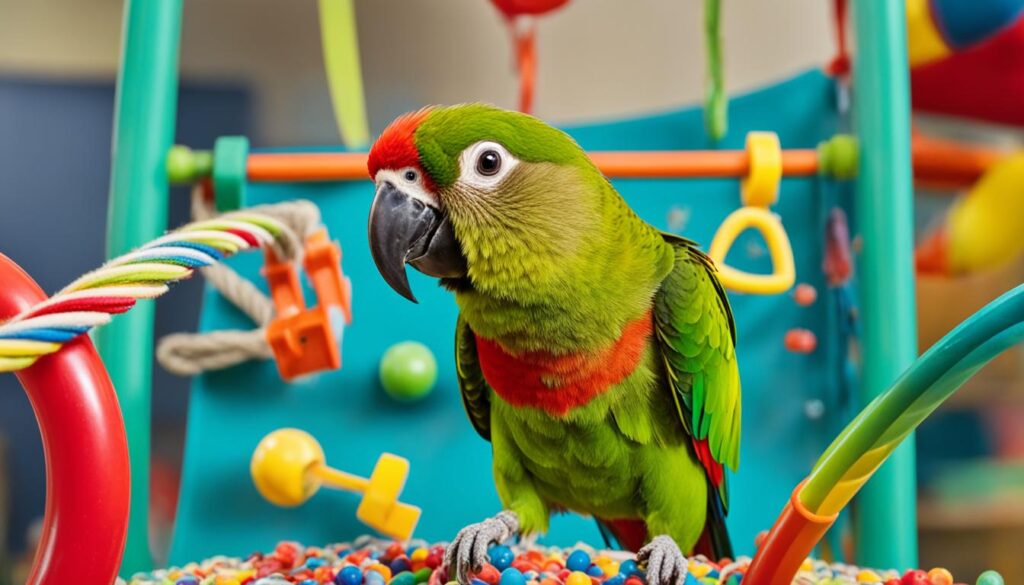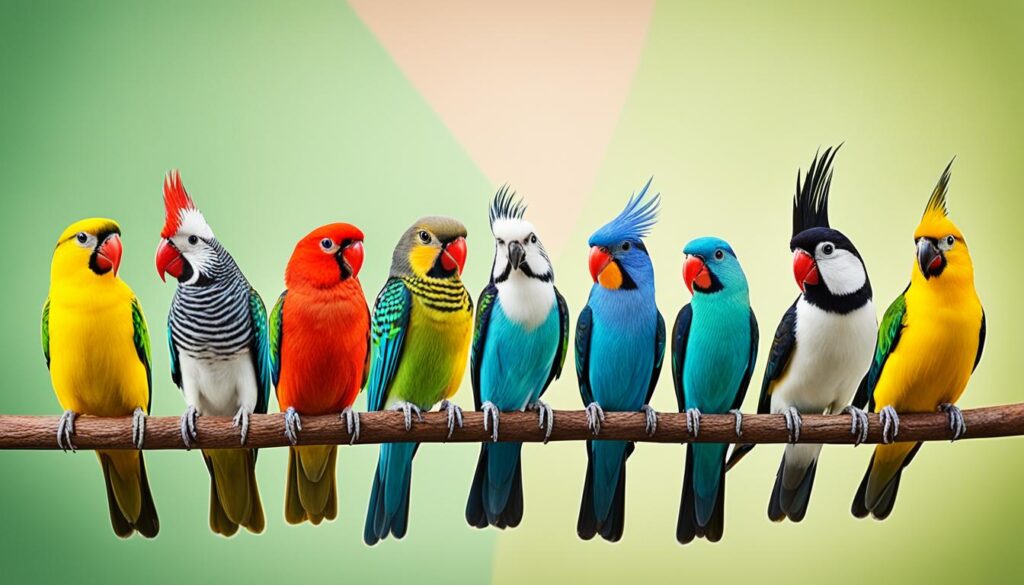Some pet birds can live for up to 80 years. That’s longer than many people spend with their friends! There are many types of birds one can choose from. This includes the famous blue and gold macaws to the clever and loving African greys. Each bird brings its own unique traits and needs into your home.
Thinking about a fun-loving parakeet or a singing canary, or maybe a cockatoo that loves to cuddle? It’s important to learn about what these birds need. Birds can live from 5 to 60 years. So, knowing what you’re getting into is key to a long, happy life together.
Key Takeaways
- Pet birds can live anywhere from 5 to 80 years, depending on the species.
- Popular pet bird species include parakeets, cockatiels, canaries, and macaws.
- Factors to consider when choosing a pet bird include lifespan, space requirements, and personality traits.
- Larger birds like African greys and macaws require more space than smaller birds like parakeets.
- Certain species, such as cockatoos and macaws, are known for their vocal nature and may require more training.
Introduction to Pet Birds
Having a pet bird is great fun and very rewarding. It doesn’t matter if you’ve had birds before or not. It’s important to know what to look for when picking a bird. Things like their size, how long they live, how loud they are, and if they need friends are key. This helps you find a bird that fits your life and makes you happy.
Factors to Consider When Choosing a Pet Bird
There are important things to think about when getting a pet bird:
- Size: A bird’s size affects where they can live and how much care they need. Big birds need lots of room and more looking after. Smaller birds are simpler to take care of.
- Lifespan: Birds can live a very long time. Some can live up to 80 years! Before getting a bird, think about how long you’re ready to take care of them.
- Noise Level: Birds can be loud, especially types like cockatoos. If you prefer a quieter friend, consider a bird that doesn’t make a lot of noise.
- Social Needs: Birds like to be around others and need to spend time with people. Some enjoy being with other birds, while some are fine alone if they spend lots of time with you.
Benefits of Owning a Pet Bird
There are many good things about having a pet bird. They offer:
- Companionship: Birds can become very close to their owners, offering friendship and comfort.
- Mental Stimulation: Taking care of a bird keeps your mind active. They need training and playtime.
- Unique Personality: Each bird is different and has their own character. This makes them interesting and fun to be around.
But, remember that birds need a lot of time and money. They also need special care and knowledge. Talking to bird experts can help you get ready to give your bird the best life.
Parakeets: The Classic Feathered Friend
Parakeets are also known as budgies or budgerigars. They’re very popular as pet birds around the world. They have lovely personalities and are easy to care for, making them great for people new to birds or experienced owners.
Personality and Temperament of Parakeets
These birds are super-friendly and love being with their human families. If you train them well, they can even say human words. Male parakeets, especially, are a good choice for those just starting out with birds. They’re usually very chill and like to make their owners happy.
Parakeets like to be active and have fun. They enjoy singing and playing with toys. They can be happy alone or with another parakeet. Either way, they’ll bring joy to their owners.
Care and Housing Requirements for Parakeets
Parakeets are loved for being easy to take care of. They need a good-sized cage with different perch sizes. This helps keep their feet healthy. A bird bath and some toys are also important for their well-being.
Feeding them the right food is key to keeping them healthy and joyful. Give them high-quality pellets, fresh fruits, and veggies, plus some treats. With the right care, they can live happily in your home for about 10 years.
“Parakeets are among the most low-maintenance types of birds kept as pets, being small in size and relatively easy to train.”

As pets, parakeets offer a lot of rewards. Their friendly nature and ability to adapt make them a great choice. Whether you’re new to keeping birds or already love them, parakeets make excellent companions.
Cockatiels: Charming and Affectionate Companions
Cockatiels are excellent talkers and show their emotions using their crests. They are loved for being gentle and cute. They are great pets for anyone, whether you’re new to birds or not.
These birds love companionship. They need attention from their human friends. Females are usually calmer, while males are more energetic and might copy noises.
Cockatiels should be with other birds to be happy. If they’re alone, they might get sad. They are smart and can learn many tricks, songs, and words.
| Cockatiel Characteristics | Details |
|---|---|
| Life Span | Cockatiels can live up to approximately 25 years, with some individuals exceeding 20 years of age. |
| Size | Fully grown cockatiels typically measure about 12 to 14 inches (30 to 36 cm) in length. |
| Enclosure Size | A single cockatiel requires a cage size of at least 20 x 20 x 24 inches (50 x 50 x 60 cm) to accommodate their active nature. |
| Temperature and Humidity Requirements | Cockatiels thrive in temperatures ranging from 65-80°F (18-27°C) and can adapt well to average household humidity levels. |
Aside from their charming looks, cockatiels are great fun. They can copy songs and sounds, even speak. Their crests show how they’re feeling, which is fun to watch.
Cockatiels make amazing friends. With care and some training, they fill your home with happiness and elegance.
Canaries: Delightful Songbirds for Your Home
Canaries are loved by many for their songs. There are over 200 kinds, each with unique looks and sounds. They are great for people who love beautiful bird songs.
Different Canary Breeds and Their Traits
Not all canaries sing the same, despite their love for music. The red factor canary is known for its bright colors. In contrast, the green roller canary sings complex and sweet melodies. However, all canaries are friendly, like to be together, and are active.
Tips for Caring for Canaries
Canaries need a special type of care. They are not very social and should not be handled a lot. A big cage allows them to fly and perch freely. Don’t forget to trim their nails about twice a year to help them stay happy and healthy.
A good diet is very important for canaries. They need seeds, fresh greens, and certain nutrients for their bright feathers. Watching how much they eat is also key because they digest food quickly.
Canaries enjoy classical music and like to be up high. With the right love and care, they bring joy with their songs to any home.

“Canaries have been kept as pets since the 17th century, and their popularity continues to this day. These small, fragile birds require a gentle touch and a quiet environment to thrive.”
Whether it’s the colors of the red factor canary or the songs of the green roller, canaries add happiness. They make great pets for people who love birds.
Doves: Gentle and Low-Maintenance Pets
Doves are perfect for those who want a bird that doesn’t need a lot of time. They are easy to care for and don’t demand constant attention. Even so, these birds love to be around people and should be able to fly and interact when alone.
What’s great about doves is they have a calming effect. Their soft sounds relax both them and their owners. They are a better fit for older kids who know how to be gentle, unlike louder parrots.
Doves need space to fly from one perch to another. For this, they should have a bigger cage than what most parrots need. This flying space is vital for their health and happiness. With a bit of care, doves can be great pets for anyone who loves birds.
Caring for Doves
There are a few things to keep in mind when caring for doves.
- Provide a large, roomy cage to allow for ample flight space
- Offer a varied diet of high-quality dove seed mix, fresh vegetables, and occasional treats
- Ensure access to clean, fresh water at all times
- Maintain a quiet, calm environment to suit their gentle nature
- Spend time interacting with your dove through gentle handling and playtime
By taking care of these simple needs, dove as pets can be very rewarding. You get a calming presence without a lot of hard work.
“Doves are the perfect pet for those who want the companionship of a bird without the high-maintenance requirements of some other species.”
| Dove Breed | Temperament | Lifespan |
|---|---|---|
| Ringneck Dove | Gentle, Quiet | 10-15 years |
| Diamond Dove | Calm, Sociable | 8-12 years |
| Mourning Dove | Easygoing, Peaceful | 5-15 years |
Doves are not just low-maintenance; they bring peace. Their coos and calm nature make them a great fit for any household. They are top picks for those wanting a gentle pet bird.
Hyacinth Macaws: The Gentle Giants
The hyacinth macaw is a standout among pet birds, known for being both huge and gentle. These birds are the biggest of all parrot types. They are famous for their bright cobalt blue feathers and friendly ways.
Housing and Care Requirements for Hyacinth Macaws
Caring for a hyacinth macaw means having a big place for them to live. This could be a roomy aviary or a large cage. They need the space to be comfortable. Their diet is vital too. It should include fresh foods and special hyacinth macaw pellets for their health.
Bonding with Your Hyacinth Macaw
Hyacinth macaws are very social and love their human family. They enjoy interacting and being around people. They can build strong, lasting bonds with their owners, enjoying cuddles and chatting. Just remember, they need a lot of your time. With good care, they can be your companion for more than 30 years.
“Hyacinth macaws are the perfect feathered companions for those who can provide the necessary time, space, and resources to care for these magnificent birds. Their striking appearance and endearing personalities make them truly unforgettable pets.”

Taking care of a hyacinth macaw is a big commitment. They need a special home, diet, and lots of attention. In the right setting, these giant birds can fill your life with joy.
Lovebirds: Tiny but Mighty Feathered Friends
Lovebirds are the smallest in the parrot family, known for their big hearts and strong connections. They win hearts by forming close bonds with their mates and owners. Though pairs are popular, they thrive solo, becoming loyal friends to their humans. This makes them an ideal pet for those wanting companionship with manageable care.
Keeping Lovebirds as Singles or Pairs
While lovebirds are sweet, they can be challenging. They sometimes nip, showing their assertive side. This means they might not be great for homes with small children. Yet, with the right care and training, they make excellent pets.
Training and Socializing Lovebirds
Training is key to having a well-behaved lovebird. Using positive methods like clicker training works wonders. It helps them learn fun tricks and good behaviors. Also, regular play and interactions are vital. This keeps them friendly and happy in their family environment.
“Lovebirds are captivating little birds that can bring a lot of joy and entertainment to pet owners, as long as their unique needs are met.”
African Grey Parrots: The Einsteins of the Bird World
The African grey parrot is known for its intelligence among pet birds. It can be compared to a smart child. This makes them the “Einsteins” of the bird family.
Cognitive Abilities and Talking Skills of African Greys
Studies showed the intellectual skill of African grey parrots is like a 4- to 6-year-old kid. They can learn many words, up to 1,500 in some cases. These parrots can also solve problems and use tools, showing a high level of intelligence.
African grey parrots also understand their owner’s feelings, much like a 2-year-old human. They pick up on emotions well. This makes them very connected and attentive pets.
Providing Mental Stimulation for African Grey Parrots
African grey parrots need a lot of mental activity to stay happy. They need about 5 hours of activities every day. This helps avoid boredom and sadness. Owners should spend time training them, playing games, and making their living space interesting.
These parrots are amazing because of their high intelligence and ability to talk. However, they are not the best choice for first-time bird owners. Training and proper care for african grey parrots
What Birds Make Good Pets
When picking a pet bird, it’s key to look at size, lifespan, and how noisy they are. Also, think about how much they like being around others. The best pet birds are usually friendly, kind, and good with people. They suit everyone, from people just starting to keep birds to those who’ve had them before.
Some great choices for pet birds are:
- Parakeets (Budgies): Parakeets are small and love being with people. They’re colorful, fun, and don’t need a lot of time.
- Cockatiels: Cockatiels are loving and fun. They like learning tricks and can copy sounds. They make great friends.
- Canaries: Canaries sing beautifully and are easy to care for. They add lovely tunes to your day.
- Doves: Doves are calm and don’t make much noise. They’re perfect if you want a quiet bird.
- Hyacinth Macaws: Hyacinth macaws are big, smart, and social. They need a lot of care and an owner who knows about birds.
- Lovebirds: Lovebirds might be small, but they’re full of life. You can have one or get a pair.
- African Grey Parrots: African Greys are very smart and can talk. They’re interesting and fun to be around.
When looking for a pet bird, do your homework. Learn about their needs, what they’re like, and if you can make a long-term commitment. With the right knowledge, pet birds can be great friends for many years.
| Bird Species | Size | Weight | Lifespan |
|---|---|---|---|
| Budgerigar (Parakeet) | 6-8 inches | 1 ounce | Up to 15 years |
| Finch | 4 inches | 0.5 ounce | 15-20 years |
| Canary | 5-30 inches | N/A | N/A |
| Dove | 9-13 inches | 3-6 ounces | 1.5 years |
| Cockatoo | Up to 18 inches | Up to 26 ounces | 10-60 years |
| Macaw | Up to 36 inches | Up to 4 pounds | More than 50 years |
“Many new bird owners end up surrendering their pets to shelters due to underestimating the time commitment required.”
It’s key to do your research and get ready when choosing a pet bird. Knowing what each bird species needs and what they’re like helps you pick the right one. This way, you and your bird can enjoy a great life together.
Cockatoos: Cuddly and Affectionate Companions
The cockatoo is a great choice for someone wanting a friendly, large bird. They form strong bonds with their owners. But, they need a lot of care and time. So, they are better suited for those with more bird experience.
Different Cockatoo Species and Their Traits
There are many types of cockatoos, each with its own personality. For example, the Umbrella Cockatoo has white feathers and loves to play. The Sulphur-crested Cockatoo is energetic and loud. The Moluccan Cockatoo is the most affectionate, creating deep connections with its owner.
Handling and Socializing Cockatoos
Good handling and socializing are key for cockatoos as pets. They need lots of attention. Neglecting this can cause problems like pulling out their feathers or breaking things. Training and varied experiences help keep them happy and make them great friends.
“Cockatoos are the true clowns of the parrot world, with their endearing personalities and affectionate nature. They bring so much joy and laughter into the lives of their owners.”
More than 60% of cockatoo owners think their birds are “cuddly” and “loving”. The Moluccan Cockatoo is often recommended for its loyalty. People love their looks and cute actions, making them popular with bird lovers.

Budgies: Small but Mighty Feathered Friends
Budgies, also known as parakeets, are incredibly popular as pets worldwide. These small, colorful birds are affordable and not too noisy. They are also easy to care for and train, requiring little space. Budgies make great friends with the right attention and care.
Deciding whether to keep a single budgie or a pair is important. Budgies love the company of others like them. A pair can be good if you’re busy, as they keep each other entertained. They need basic interaction and care to be happy.
Budgies can live up to 18 years when well looked after. They are perfect for beginners in bird keeping. But they need a varied diet, space, and regular interaction for their well-being.
Budgie Personality and Temperament
Budgies are full of life and love to play. They are smart and form strong bonds with people. Budgies need interaction and enjoy activities like climbing and exploring. They are gentle and fit well in families with kids when supervised.
Budgie Care and Housing
For a budgie’s health and happiness, proper housing and care are a must. They need a big cage with plenty of perches for exercise. A diet of seeds, pellets, fruits, and veggies keeps them healthy.
Interaction and mental challenges are also important for budgies. Toys like mirrors and swings keep them entertained. This prevents boredom and encourages their natural behaviors.
“Budgies are the perfect feathered friends for those seeking a lively, interactive, and low-maintenance pet bird.”
In summary, budgies offer joy and friendship in a small package. With their vibrant characters and easy care, they are great for anyone wanting a bird friend.
Green-Cheeked Conures: Entertaining and Playful Pets
Coming from South America’s lush forests, green-cheeked conures stand out for their fun-loving and social nature. They’re smart and make great companions for bird lovers. These birds win hearts with their lively and loving ways.
Compared to their noisy conure relatives, green-cheeked conures are less loud. They might not talk much, but they are always up for fun activities with you. They get sad if left alone too often.
Green-cheeked conures love to play. They enjoy climbing, swinging, and even doing tricks. With their bright green feathers and colorful accents, they’re a joy to look at.
| Key Attributes of Green-Cheeked Conures | Details |
|---|---|
| Temperament | Intelligent, playful, and slightly mischievous |
| Vocalization | Quieter compared to other conure species, may not learn extensive talking |
| Interaction | Thrive on constant socialization and can become depressed if ignored |
| Appearance | Vibrant green plumage with splashes of red, blue, and yellow |
If you’re looking for an engaging pet bird, consider a green-cheeked conure. They keep you entertained without needing too much. Their fun-loving nature adds joy to any home that loves birds.

“Green-cheeked conures are like little clowns, always keeping you entertained with their amusing antics and endearing personalities.”
Eclectus Parrots: Striking Beauty and Intelligence
The eclectus parrot comes from the lush rainforests of Papua New Guinea. It’s loved for its bold colors. Males are bright green, and females show off a deep red. This vibrant contrast makes them truly eye-catching.
Understanding the Dimorphism in Eclectus Parrots
Male and female eclectus parrots have strikingly different looks. This isn’t just for show. It actually plays a key role in their lives. Females are the leaders, while males are more easygoing and enjoy daydreaming.
It’s not just their appearances that differ. Unlike many parrot species, eclectus parrots don’t just bond with one person. They can connect with several people. Still, they can be picky, showing a preference for some folks over others.
Training and Socialization Needs of Eclectus Parrots
These parrots are smart but sensitive to their surroundings. Noisy or chaotic environments can stress them out. They do best with a steady routine and lots of social time. While they can learn to talk, they’re generally not as chatty as some parrots.
Feeding an eclectus parrot requires a special diet. They need lots of fiber and vitamin A but should eat less fat. Hormonal changes in these birds can cause some odd behaviors. Owners need to be patient and caring during these times.
In summary, eclectus parrots are both beautiful and intelligent. Knowing about their unique characteristics and care needs is important for anyone wanting to own one. They truly thrive when given the right love and attention.
| Parrot Species | Lifespan | Size (Length) | Size (Weight) |
|---|---|---|---|
| Eclectus Parrot | 50+ years | 17-20 inches | 13-19 ounces |
| Umbrella Cockatoo | 70-80+ years | 18 inches | 16-26 ounces |
| Yellow-Naped Amazon | 70+ years | 12-15 inches | 17-24 ounces |
| Sulphur-Crested Cockatoo | 80 years | 15-20 inches | 12-31 ounces |
| Blue-and-Gold Macaw | 50+ years | 30-36 inches | 28-46 ounces |
| Scarlet Macaw | 50+ years | 31-38 inches | 32-39 ounces |
| Hyacinth Macaw | 60+ years | 40 inches | 42-51 ounces |
“Eclectus parrots are capable of biting, but their bites are considered less forceful compared to other birds of similar size, such as amazons. These birds are known for being polite and are less likely to bite, often pushing fingers or hands away.”
Conclusion
When picking a pet bird, you need to think about its size, how long it lives, how loud it is, and how social it is. This helps make sure the bird fits well with your life and home. All birds need special care and a lot of time. But, the joy they bring is big.
Choices range from the well-loved parakeets to the super smart African grey parrots. Doing your homework and setting up your home right are crucial. By learning about different bird types, you can find the best pet bird. This ensures a great experience of pet bird ownership.
Adding a bird to your family is a big step. Yet, with careful planning, hard work, and lots of love, you’ll form a deep bond with your new bird. And, you’ll get to enjoy the wonderful world of bird friends.
FAQ
What factors should I consider when choosing a pet bird?
When picking a pet bird, think about its size, lifespan, and how loud it is. You also want to match its social needs with your life. Consider how the bird acts, what it eats, and if it’s easy to train.
What are the benefits of owning a pet bird?
Having a bird can mean fun, a friend, and a hobby. They’re smart and can get close to you. This can be very fulfilling.
What makes parakeets (budgies) such popular pet birds?
Parakeets are top picks because they’re not hard to take care of. They’re loving and smart. Plus, they’re affordable and small, great for new bird owners.
How do the personalities and care requirements of cockatiels differ from other pet birds?
Cockatiels are big on talking and feelings, especially the girls. But they need a lot of your time and should have a friend around. This keeps them happy and healthy.
What are the unique traits of canaries as pet birds?
Canaries stand out for their songs, sung by the males. They’re quiet and shy, needing time to get used to you. They like a big cage and peace and quiet.
Why are doves considered a good option for low-maintenance pet birds?
Doves are chill and not demanding, fitting with a busy life. Even if you have just one, they’re friendly. They need some room to fly and time with you is important.
What makes hyacinth macaws such desirable, yet challenging, pet birds?
Hyacinth macaws are the largest and quite loving. They need plenty of space and your time, more than most. With the right care, they form strong bonds with their owners.
How do the social needs of lovebirds differ from other pet birds?
Lovebirds are small but big on love with their mates. They don’t always need a second lovebird, one can do. They’re close with their owners and a bit more work.
What makes African grey parrots stand out as the “Einsteins of the bird world”?
The African grey is really smart and learns to talk well. However, they need a lot from you and are complex. They’re not for beginners.
What are the key traits and care requirements of cockatoos as pet birds?
Cockatoos are big on love and bond deeply with their families. But they can get sad without enough attention. They’re better for those who know birds well.
How do the personalities and care needs of green-cheeked conures differ from other conure species?
Green-cheeked conures are quieter and like an easy life. They’re big on socializing and can get down if they feel alone. They’re sharp and love to play but might not talk much.
What makes eclectus parrots unique in their appearance and care requirements?
Eclectus parrots look different depending on if they’re male or female. They like peace and quiet and do best with a steady routine. They also enjoy being with people.


Hello there! Do you know if they make any plugins to help with Search Engine Optimization? I’m
trying to get my website to rank for some targeted keywords
but I’m not seeing very good results. If you know
of any please share. Many thanks! I saw similar blog here: Wool product
Hello there! Do you know if they make any plugins to assist with SEO?
I’m trying to get my site to rank for some targeted keywords but I’m not seeing very good
success. If you know of any please share. Appreciate
it! I saw similar blog here: Code of destiny
I am really impressed together with your writing talents and also with the structure in your blog.
Is this a paid theme or did you modify it your self? Anyway keep up
the excellent high quality writing, it’s uncommon to
look a great weblog like this one nowadays.
Blaze AI!
I am extremely impressed with your writing abilities as neatly as with the layout in your blog.
Is that this a paid topic or did you modify it your
self? Anyway stay up the nice high quality writing, it’s rare to
see a nice weblog like this one these days. Tools For Creators!
I’m extremely inspired together with your writing talents as neatly as with the layout for your weblog. Is this a paid subject or did you modify it your self? Anyway keep up the excellent high quality writing, it’s rare to see a great weblog like this one these days. I like talkbirds.com ! My is: Stan Store alternatives
I am really impressed along with your writing talents and also with the layout on your blog.
Is that this a paid theme or did you modify it yourself?
Anyway keep up the excellent high quality writing, it is uncommon to see a great
blog like this one nowadays. TikTok Algorithm!